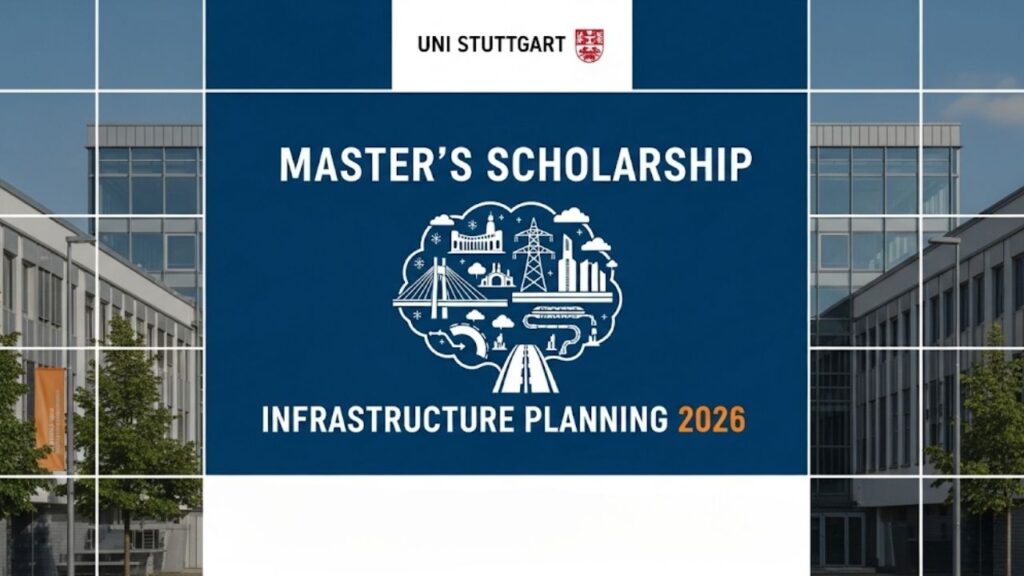Dreaming of shaping the cities of tomorrow? The Master’s Scholarship in Infrastructure Planning 2026 at the University of Stuttgart might just be your golden ticket. This prestigious, fully-funded opportunity isn’t just about earning a degree from a world-class German university; it’s about gaining the skills to tackle complex urban and regional challenges on a global scale. This guide is your personal roadmap, designed to walk you through every step of the process, from understanding the benefits to submitting a standout application. Let’s build your future, together.

Master’s Scholarship in Infrastructure Planning 2026
| Key Fact | Detail |
| Full Funding | Covers monthly stipend (€934), health insurance, travel allowance, and study fees. DAAD EPOS Program |
| Target Audience | Professionals from developing countries (DAC list) with work experience. |
| Application Window | Typically July 15 to September 30, 2025, for the winter 2026 intake. MIP Stuttqgart Application Info |
Securing the Master’s Scholarship in Infrastructure Planning 2026 is a challenging but incredibly rewarding journey. It demands careful preparation, a compelling story, and a clear vision for your future. By following this guide, you’ve already taken the first step. Start preparing your documents early, pour your heart into your motivation letter, and don’t be afraid to dream big. Your expertise is needed to build a better world, and this scholarship could be the key that unlocks your potential.
Why the University of Stuttgart’s MIP Program?
Before diving into the scholarship, let’s talk about the destination. The Master’s in Infrastructure Planning (MIP) at the University of Stuttgart is not just another engineering program. It’s an interdisciplinary course designed for the 21st century, blending technical know-how with social, economic, and environmental sciences.
You’ll be studying at one of Germany’s leading technical universities (TU9), located in a city known for its innovation and high quality of life. The MIP program stands out for a few key reasons:
- Holistic Approach: It trains you to think beyond concrete and steel, focusing on creating sustainable and resilient infrastructure systems for communities.
- International Focus: The course is taught entirely in English and attracts students and faculty from all over the world, creating a rich, multicultural learning environment.
- Strong Industry Connections: Stuttgart is a hub for engineering and technology (home to Porsche and Mercedes-Benz), offering fantastic networking and practical learning opportunities.
Unpacking the Master’s Scholarship in Infrastructure Planning 2026
This scholarship is part of the highly respected DAAD EPOS (Development-Related Postgraduate Courses) initiative. The goal is to train specialists from developing countries to become future leaders who can drive positive change in their home nations.
What’s Included? A Look at the Financial Benefits
One of the biggest hurdles to studying abroad is the cost. This scholarship removes that barrier entirely, allowing you to focus completely on your studies. Here’s what it typically covers, based on the official DAAD EPOS benefits:
- Monthly Stipend: A generous monthly payment of €934 to cover living expenses.
- Health Insurance: Comprehensive health, accident, and personal liability insurance coverage.
- Travel Allowance: A lump sum to cover your travel costs to and from Germany.
- Tuition-Free Study: The scholarship covers all university tuition fees.
- German Language Course: You may be offered a 6-month intensive German course before the program starts, helping you integrate into German life.
Who Is This Scholarship For? Key Eligibility Criteria
This scholarship is highly competitive and has specific requirements. You are the ideal candidate if you have a passion for development and a clear vision for your future.
According to the MIP admission requirements, you must have:
- A Relevant Bachelor’s Degree: Your degree should be in a field like civil engineering, architecture, urban planning, or a related discipline.
- Professional Work Experience: A minimum of two years of relevant professional experience after your first university degree is mandatory. This is a critical requirement that demonstrates your commitment to the field.
- Strong Academic Record: Excellent grades from your previous university studies are essential.
- English Proficiency: You’ll need to prove your English skills with a recognized test like TOEFL or IELTS.
- Nationality: You must be a citizen of a country on the DAC list of developing countries.
- Development-Related Motivation: You need to convincingly demonstrate how this degree will help you contribute to the social and economic development of your home country.
Your Step-by-Step Application Guide
Feeling ready to apply? Let’s break down the process into manageable steps. Preparation is everything.
Step 1: Verify Your Eligibility and Deadlines
First things first: triple-check that you meet all the criteria listed above. Pay close attention to the application window, which is typically July 15 to September 30, 2025. Deadlines are strict and non-negotiable in Germany!
Step 2: Gather Your Essential Documents
Start collecting these documents well in advance. Getting official transcripts or signed letters can take weeks.
- Signed DAAD Application Form: Downloadable from the DAAD website.
- Hand-Signed CV: Use the Europass format.
- Motivation Letter: A one-page letter detailing your academic and professional reasons for applying (more on this below).
- Letters of Recommendation: One from a university professor and one from your current or most recent employer. They must be on official letterhead, signed, and stamped.
- Proof of Employment: A certificate from your employer(s) proving at least two years of relevant experience.
- English Language Certificate: A valid TOEFL or IELTS score report.
- Academic Transcripts and Degree Certificate: Officially certified copies and translations (if not in English or German).
Step 3: Crafting a Winning Motivation Letter
Your motivation letter is your chance to speak directly to the selection committee. It’s the most personal part of your application and arguably the most important.
A great letter should connect your past (your academic and professional background), your present (why you want to study this specific program at Stuttgart), and your future (how you will use this knowledge back in your home country).
- Be Specific: Don’t just say you’re “passionate about infrastructure.” Talk about a specific problem in your home country—a transportation bottleneck, a water management issue—and explain how the MIP curriculum will give you the tools to solve it.
- Show, Don’t Tell: Instead of saying you are a “hard worker,” describe a challenging project you managed and its successful outcome.
- Do Your Research: Mention specific professors, courses, or research institutes at the University of Stuttgart that interest you. This shows you’ve done your homework.
Step 4: The Online Application Process
The application is submitted directly through the University of Stuttgart’s C@MPUS online portal.9 You will upload all your required documents there. Make sure your scanned documents are high-quality and clearly legible. Double-check everything before hitting “submit.”
Life in Stuttgart: What to Expect 🇩🇪
Moving to a new country is a huge adventure! Stuttgart is a vibrant, green city nestled in the heart of one of Germany’s most picturesque regions. It offers a fantastic quality of life, with beautiful parks, a bustling cultural scene, and easy access to the Black Forest and the rest of Europe.
The Ultimate Guide to Winning an AAUW International Fellowship in 2026
Your Guide to Navigating the Faraday Discovery Fellowships 2025
FAQs
Q1:Do I need to speak German to apply?
No, the MIP program is taught entirely in English. You only need to provide proof of English proficiency. However, learning German is highly recommended for daily life in Germany.
Q2:What kind of work experience is considered “relevant”?
Relevant experience includes roles in urban or regional planning, civil engineering projects, environmental management, public administration related to infrastructure, or work with NGOs in the development sector.
Q3:Can I apply if I am in my final year of my Bachelor’s degree?
No. A key requirement for the DAAD EPOS scholarship is a minimum of two years of professional work experience after you have completed your first degree.










